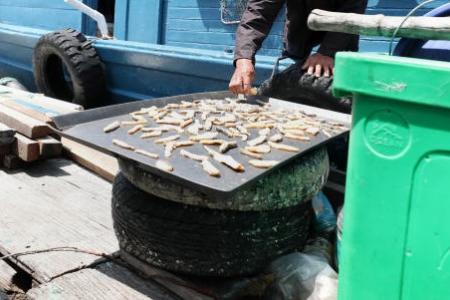Salted fish and cancer - what's the link?
If you visit the website of the National Heritage Board, you may come across an article titled Against All Odds: Salted Fish In Cantonese Cuisine in Singapore.
It describes how, in 1934, the Sanitary Board in colonial Singapore banned the sale of salted fish in Lau Pa Sat because of its smell.
From the 1970s to 1990s, the sale of salted fish was dealt another blow as evidence emerged that the consumption of salted fish was associated with the risk of nasopharyngeal cancer.
And yet, it has remained an important ingredient in Cantonese cuisine here, almost indispensable in claypot rice, stewed tofu and minced meat dishes.
But are salted fish lovers exposing themselves to a huge risk of cancer?
The cancer that is most closely associated with Chinese-style salted fish is cancer affecting the back of the nose, known as nasopharyngeal cancer.
The increase in risk of this cancer associated with eating salted fish varies across different studies done between the 1970s and recent years. The ballpark figure is round about two times the baseline risk.
What is in salted fish that triggers the increased risk?
Well, nitrosamine. It is a substance produced during the curing of the fish.
Laboratory experiments on human cell models have demonstrated a fairly high mutation-inducing potency in nitrosamine. The transformation of normal cells into cancer cells is basically a process driven by cumulative genetic mutations.
What about real-life data linking nitrosamine to nasopharyngeal cancer outside a laboratory?
Epidemiological studies have shown that the amount of nitrosamine excreted in the urine of people living in areas in China with a high risk of nasopharyngeal cancer is significantly higher than in other areas.
Different methods of curing salted fish in different parts of China produce different concentrations of nitrosamine in the fish.
Interestingly, areas using methods associated with a higher concentration of nitrosamine in the fish have a higher incidence of nasopharyngeal cancer.
What level of salted fish consumption is dangerous?
There isn't a red line, a threshold consumption beyond which the risk of nasopharyngeal cancer rockets. The relation between consumption and risk is one of dose-response. In plain language: The more you eat, the higher the risk.
Studies done in Hong Kong comparing the nasopharyngeal cancer risk of the boat people of Hongkong (known as the Tanka people) and their land-dwelling brethren yielded interesting insights.
While salted fish is fairly popular among both groups, the per capita consumption is higher among the boat people. When it comes to the incidence of nasopharyngeal cancer, you have guessed it, it is much higher among the boat people.
As per capita consumption of salted fish decreased in Hong Kong and Singapore over the last few decades, so has the incidence of nasopharyngeal cancer in their populations.
When it comes to nasopharyngeal cancer risk, it is not just how much salted fish you eat, but when you eat it.
By "when", I mean the age at which you eat it.
The dose-response relationship between salted fish consumption and nasopharyngeal cancer is the strongest among young people, specifically children under age 10.
Exposure to the carcinogenic effects of salted fish at a tender age seems particularly harmful. The old practice of adding salted fish to a baby's weaning diet was, in retrospect, probably a bad idea.
The dose-response effect is much weaker among adults. That the occurrence of nasopharyngeal cancer peaks at a relatively young age - around 45 to 55 - lends credence to the theory that exposure to the underlying trigger likely occurred at a young age.
So, kids, stay away from cigarettes. And salted fish.
Are there any groups that are more vulnerable to the potential carcinogenic effects of salted fish?
One group is people who have been exposed to the Epstein Barr virus (EBV), with an infection magnifying the nasopharyngeal-cancer-causing effect from a high intake of salted fish.
Substances in salted fish appear to reactivate the dormant EBV in the body. Studies show that about two-thirds of Singaporeans have been exposed to this virus, which means a pretty big pool of people at risk.
Another group at risk are those with a family history of nasopharyngeal cancer.
Studies showed a family history of the cancer can magnify the carcinogenic effects of salted fish, much like EBV infection.
What is not clear, though, is whether this is a result of genetic inheritance or common exposure within a family to other carcinogenic factors in the shared environment.
In any case, if you have a family history of nasopharyngeal cancer, you certainly have a stronger motivation to stay away from salted fish.
The International Agency for Research on Cancer, under the World Health Organisation, has listed Chinese-style salted fish as a Category One carcinogen for nasopharyngeal cancer since 1992.
And the cancer-causing effect of salted fish does not even stop with nasopharyngeal cancer. It has also been associated with an elevation of the risk of gastric cancer and oesophageal cancer.
The scientific findings surrounding salted fish may not go down well with people who enjoy the delectable taste and fragrant smell of salted fish-inspired dishes.
So, do I sometimes indulge in Cantonese dishes prepared with salted fish? Actually, I do. After all, I am Cantonese.
- Dr Wong Seng Weng is the medical director and consultant medical oncologist at The Cancer Centre.
Get The New Paper on your phone with the free TNP app. Download from the Apple App Store or Google Play Store now



